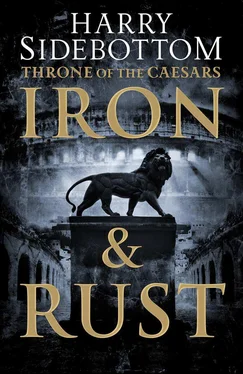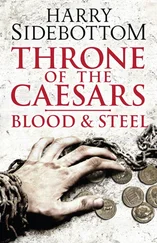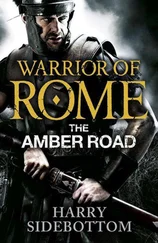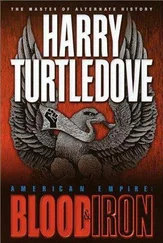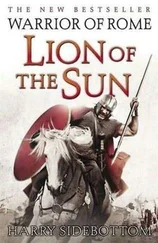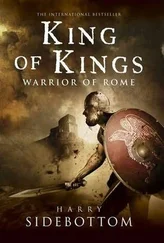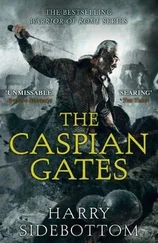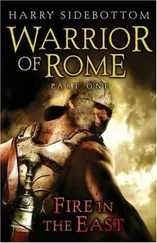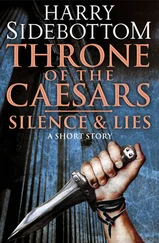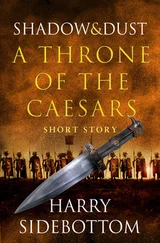Harry Sidebottom - Iron and Rust
Здесь есть возможность читать онлайн «Harry Sidebottom - Iron and Rust» — ознакомительный отрывок электронной книги совершенно бесплатно, а после прочтения отрывка купить полную версию. В некоторых случаях можно слушать аудио, скачать через торрент в формате fb2 и присутствует краткое содержание. Год выпуска: 2014, Издательство: HarperCollins Publishers, Жанр: Исторические приключения, на английском языке. Описание произведения, (предисловие) а так же отзывы посетителей доступны на портале библиотеки ЛибКат.
- Название:Iron and Rust
- Автор:
- Издательство:HarperCollins Publishers
- Жанр:
- Год:2014
- ISBN:нет данных
- Рейтинг книги:4 / 5. Голосов: 1
-
Избранное:Добавить в избранное
- Отзывы:
-
Ваша оценка:
- 80
- 1
- 2
- 3
- 4
- 5
Iron and Rust: краткое содержание, описание и аннотация
Предлагаем к чтению аннотацию, описание, краткое содержание или предисловие (зависит от того, что написал сам автор книги «Iron and Rust»). Если вы не нашли необходимую информацию о книге — напишите в комментариях, мы постараемся отыскать её.
Iron and Rust — читать онлайн ознакомительный отрывок
Ниже представлен текст книги, разбитый по страницам. Система сохранения места последней прочитанной страницы, позволяет с удобством читать онлайн бесплатно книгу «Iron and Rust», без необходимости каждый раз заново искать на чём Вы остановились. Поставьте закладку, и сможете в любой момент перейти на страницу, на которой закончили чтение.
Интервал:
Закладка:
Rome’s latest goddess, Caecilia Paulina, stared back at him. As with Maximinus at the beginning, he had no idea what she really looked like. A hideous old crone, Acilius Glabrio had said unhelpfully. The other two magistrates had been less offensive, but no more informative. It was a sign of the regime’s lack of concern for anything apart from the northern wars that the arrogant young fools had not been replaced when their normal term of office had come to an end.
He had given the late Empress a hairstyle favoured by women of the previous dynasty: clear waves drawn into a bun at the back. On top he had added a modest veil. For her features he had relied on an obviously spurious resemblance to her husband. Throughout the empire, Caecilia Paulina would be remembered for the prominence of her nose and chin.
It was a good piece of work. The peacock, the empty symbol which tradition demanded for the reverse could not occupy his mind. He had stood and watched as Pontianus was arrested. He had lied to Fabianus. He had not done nothing. In his weakness and his fear, he had denied knowing Pontianus. When the mob chanted, the die-cutter had mouthed the words. In the past, other men had done the same. There were names for them. There were names for him.
CHAPTER 29
The East
Northern Mesopotamia,
the Ides of May, AD237
‘Chaboras River ahead.’
Gaius Julius Priscus raised himself on the horns of his saddle and peered over the heads of the legionaries and archers.
Julius Julianus, the Prefect of 1st Legion Parthica, pointed.
Through the dust raised by the cantering Persian cavalry, Priscus could make out a line of dark trees across the low horizon, a mile or more ahead. He caught flashes of colour against the foliage. Below what he knew must be Sassanid standards he saw a glint of sunlight on steel. It would be another contested river crossing.
‘Here they come again.’
The big shields of the legionaries clattered up and together. Sporakes moved his mount up alongside that of Priscus. The bodyguard covered them both with his shield. With their greater range, the Roman archers on foot and the handful of slingers shot first. Priscus kept his head down. There was no point in watching the effect of the volley. No matter how many easterners went down, there were always more.
With a horrible tearing sound, the Persian arrows rained down. They thumped into wood, dinged off steel. The feathers of one quivered in the shoulder of a horseman near Priscus. He rocked in the saddle. His horse shied, and he crashed to the ground.
‘Help him,’ Priscus shouted. He pointed to another of his Horse Guards. ‘You, get him to the baggage, then rejoin the standard.’
The trooper swung down by his fallen comrade. Another caught the reins of both horses. There had been thirty Equites Singulares when they set out. There were twenty left. Nineteen now.
‘Not far to go, boys.’ Priscus called over the din. ‘One more river, and we will be safe in Resaina. Kill a few more reptiles, then a cool bath, a good meal, a young girl or boy; whatever you want.’
Despite it all, the men gave a shout of mock lust.
‘Hold your places. Silence in the ranks. Listen for your orders. We are almost home.’
Nothing had gone right with this campaign. At the meeting in Samosata the previous autumn, knowing the reluctance of Persian armies to remain in the field over winter, the governors had decided the field army would gather in the new year. They had underestimated the determination of the Sassanid King. The outlying columns around Resaina and Carrhae had withdrawn, but the main force remained encamped under the walls of Nisibis.
In March, when the contingents had straggled into Zeugma, several were under strength. Licinius Serenianus had not come himself. An earthquake had devastated several cities in Cappadocia, and the governor had been forced to remain to quell widespread unrest as the locals sought to lynch every suspected Christian in the province as being the cause of the disaster. He had, however, sent the eight thousand men he had promised. Likewise, Ma’na of Hatra had appeared with the two thousand riders he had pledged from his father’s city. The others had not fulfilled their obligations. Junius Balbus had sent two thousand, not four, from Syria Coele, and Otacilius Severianus just two thousand, not eight, from Syria Palestina. Priscus had never had much time for his brother-in-law Severianus. The family had thought the Senator a good match for his sister, but from the start Priscus could tell Otacilius Severianus had the heart of a deer. Unlike the pusillanimous Romans, the Armenian Prince Chosroes had a justifiable reason for riding up with only a thousand men at his back, not ten thousand. Another Persian army, led by the King of Kings himself, was marching up the Araxes river towards the city of Artaxata. Tiridates of Armenia was fighting for the survival of his kingdom.
It had been April when Priscus had led the army over the Euphrates and to the East. They had gone via Batnae, Carrhae, Resaina and Amouda. They had collected small contingents of the army of Mesopotamia at each town. Manu of Edessa had brought down a levy of five hundred local bowmen. All told, the total number of combatants was less than eighteen thousand.
From Resaina on, they had been shadowed by enemy scouts. But no attempt had been made to hinder their progress. The reason became clear when the vanguard breasted a low hill and Nisibis came into sight. Sassanid banners flew from the battlements. How long it had been since the town had fallen, no one in the Roman army could say. Across the plain before the walls a Persian army was drawn up for battle. It was at least thirty thousand strong: cavalry, infantry, even camels and a few elephants. The Romans had walked and ridden hundreds of miles into a trap.
Priscus had ordered a camp entrenched. The Persians had not interfered. The next day Priscus kept his men behind the palisades. The Sassanid horsemen had spread across the plain. They had come close, and shouted abuse, but had not attacked. Having cut the supply lines, they knew the Romans could not stay there for long. Time was on their side.
The second evening, Priscus had watched the enemy streaming back into Nisibis for the night. The town gates shut behind them. Then, and only then, Priscus had summoned his high command, and some senior centurions, and gave his orders.
They had left the wagons behind. A hundred volunteers from the auxiliary cavalry, including trumpeters, stayed to keep the campfires burning and to make the calls that marked the watches of the night. Before first light, they had galloped after the rest of the army, which had stolen away like a thief in the night.
The third hour of the next day they had been a couple of miles short of Amouda when the Sassanid light cavalry caught up with them. Priscus had ordered the column to halt, the infantry to form testudo , the cavalry to dismount behind them. Exhilarated by their wild chase, the Persians must have thought that the Romans were dropping with fatigue, were completely at their mercy. They whooped, and charged. Through the Roman ranks the officers had repeated Priscus’ instruction: no one shoot until the signal. When the Sassanids were no more than forty paces away — already reining in, their charge faltering in the face of such unexpected immobility — a trumpet had rung out. It was picked up by others along the line. Too late, the easterners sawed on their reins. They had run into a deadly storm of thousands of javelins and arrows. Men and horses, both brightly liveried, went down, bloodied and fouled, rolling in the dirt. The survivors raced away. It had bought the army time to reach the gates and cram itself into the alleys, porticos and open spaces of the small town.
Читать дальшеИнтервал:
Закладка:
Похожие книги на «Iron and Rust»
Представляем Вашему вниманию похожие книги на «Iron and Rust» списком для выбора. Мы отобрали схожую по названию и смыслу литературу в надежде предоставить читателям больше вариантов отыскать новые, интересные, ещё непрочитанные произведения.
Обсуждение, отзывы о книге «Iron and Rust» и просто собственные мнения читателей. Оставьте ваши комментарии, напишите, что Вы думаете о произведении, его смысле или главных героях. Укажите что конкретно понравилось, а что нет, и почему Вы так считаете.
